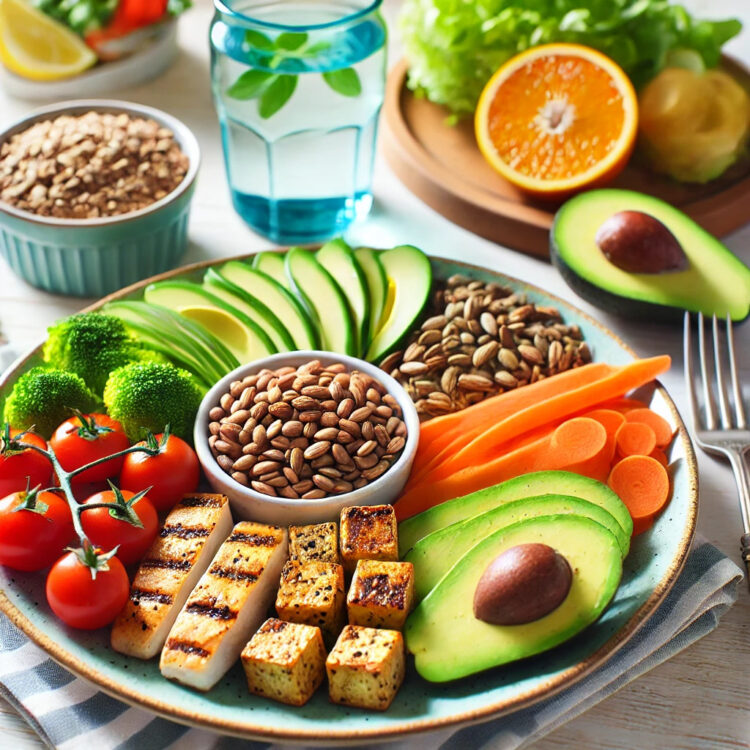A balanced diet is the foundation of good health. It provides the body with essential nutrients, vitamins, and minerals to function optimally. In today’s fast-paced world, processed foods, unhealthy eating habits, and lack of proper nutrition can lead to various health issues like obesity, heart disease, and diabetes.
This guide will help you understand the key components of a balanced diet and practical tips to make healthy eating a part of your daily routine.
What is a Balanced Diet?
A balanced diet includes a combination of macronutrients (carbohydrates, proteins, fats) and micronutrients (vitamins and minerals) in the right proportions to maintain energy, immunity, and overall well-being.
Key Components of a Balanced Diet:
1️⃣ Carbohydrates (50-60%) – Provide energy (e.g., whole grains, fruits, vegetables).
2️⃣ Proteins (15-20%) – Help in muscle growth and repair (e.g., lentils, eggs, chicken).
3️⃣ Healthy Fats (20-30%) – Essential for brain function and hormone production (e.g., nuts, seeds, olive oil).
4️⃣ Vitamins & Minerals – Boost immunity and improve body functions (e.g., leafy greens, dairy, citrus fruits).
5️⃣ Fiber & Water – Aids digestion and detoxification (e.g., whole grains, fresh vegetables, water).
10 Practical Balanced Diet Tips for a Healthy Lifestyle
1. Eat a Variety of Foods 🥗
A healthy diet includes a mix of proteins, carbohydrates, and fats to ensure all essential nutrients are covered.
🔹 Example: Include whole grains (brown rice, quinoa), lean proteins (chicken, paneer), and vegetables in every meal.
2. Prioritize Whole Foods Over Processed Foods 🌿
Processed foods contain excess salt, sugar, and unhealthy fats, which can lead to weight gain and health issues.
🔹 Healthy Swap: Replace white bread with whole wheat bread, soda with fresh lemon water, and fried snacks with roasted nuts.
3. Control Portion Sizes 🍽️
Overeating, even healthy food, can lead to weight gain. Mindful eating helps prevent unnecessary calorie intake.
🔹 Tip: Use smaller plates, measure portion sizes, and eat slowly to improve digestion and avoid overeating.
4. Include Protein in Every Meal 🍳
Proteins are essential for muscle repair, energy, and satiety.
🔹 Best Protein Sources:
✔ Plant-based: Lentils, chickpeas, tofu, quinoa
✔ Animal-based: Eggs, chicken, fish, yogurt
🔹 Example: Instead of a plain vegetable sandwich, add paneer or hummus for extra protein.
5. Choose Healthy Fats 🥑
Not all fats are bad! Healthy fats help with brain function and reduce inflammation.
🔹 Best Sources: Nuts, seeds, avocados, olive oil, coconut oil
🔹 Avoid: Processed oils, trans fats, deep-fried foods
🔹 Example: Replace butter with avocado spread on toast for a heart-healthy alternative.
6. Stay Hydrated 💧
Water plays a crucial role in digestion, metabolism, and detoxification.
🔹 Tip: Aim for 8-10 glasses of water daily, and include herbal teas, coconut water, and fresh fruit juices for hydration.
7. Increase Fiber Intake 🌾
Fiber promotes healthy digestion and prevents bloating and constipation.
🔹 Best Fiber Sources: Whole grains, legumes, nuts, seeds, fruits, vegetables
🔹 Example: Swap white rice with quinoa or add flaxseeds to smoothies for an extra fiber boost.
8. Reduce Sugar and Salt Intake 🍬
Excess sugar and salt can cause weight gain, high blood pressure, and diabetes.
🔹 Healthy Swaps:
✔ Replace sugar with honey or jaggery
✔ Use herbs and spices instead of excess salt
✔ Drink fresh fruit juices instead of sugary drinks
9. Eat at Regular Intervals ⏰
Skipping meals or eating at irregular times can lead to overeating and poor digestion.
🔹 Tip: Have 3 main meals and 2 healthy snacks daily to maintain energy levels.
🔹 Example: Carry nuts or yogurt as a snack to avoid unhealthy cravings.
10. Plan & Prepare Meals in Advance 📅
Planning meals helps avoid unhealthy last-minute food choices.
🔹 Meal Prep Ideas:
✔ Cook grains (quinoa, rice) in bulk
✔ Chop vegetables in advance
✔ Store homemade snacks (energy bars, roasted nuts)
🔹 Example: Prepare a weekly meal plan to ensure balanced eating throughout the week.
Conclusion
A balanced diet is not about eliminating food groups but including the right proportions of nutrients for optimal health. By choosing whole foods, controlling portions, staying hydrated, and eating mindfully, you can achieve a healthier lifestyle without restrictions.
Start making small changes today! Try these balanced diet tips and feel the difference in your energy and well-being.

